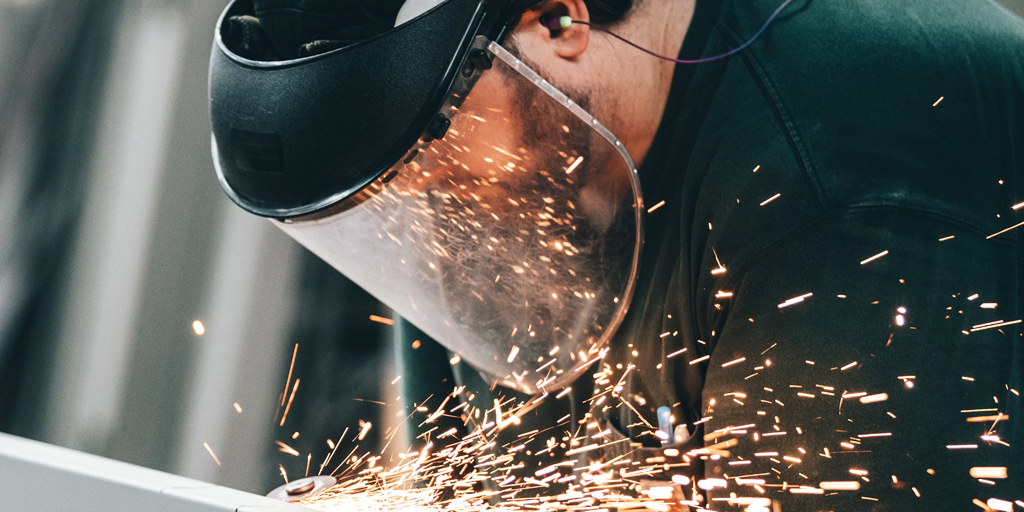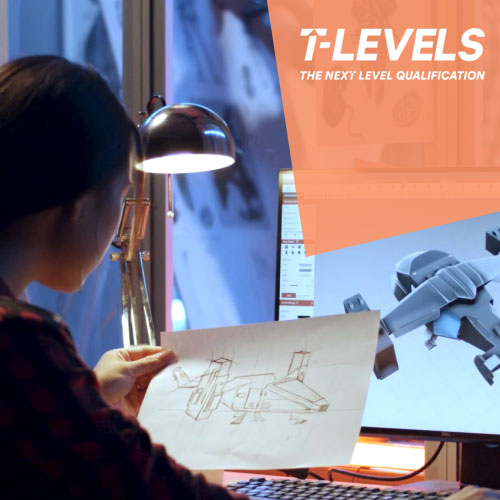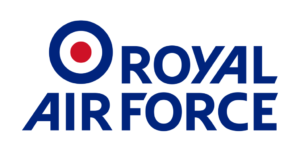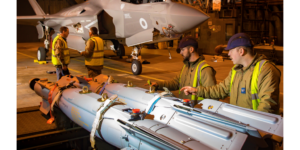
Welder careers guide & job profile
Your skill with metal construction means you can work anywhere on land or sea…
To weld something together means to join things up. As a welder you cut and join metals, plastics or alloys together using intense heat and gas. You’ll make the joined areas strong enough to form part of a building, car, machine or aircraft that people can trust with their lives.
Your skill with metal construction means you can work anywhere, from oil rigs and skyscrapers to offshore wind farms. The frequent need for welders means this is a super-hot opportunity to connect the career dots.
How much money can you earn as a Welder?
These LMI Job Trends give you a sneak peek of how much you could earn starting out for this career, and how much your salary could grow with experience.
Average salary for welding jobs
Recent labour market information says you can earn up to £37,000 a year as a welder in the UK.
Your starting salary can vary because of factors like level of experience, training, or location. Your salary will increase over time as you build skills, knowledge and experience.
Engineering Career FAQs & Insights
Is there something you’d like to know about engineering careers? Maybe we can help!
Skills you need to become a Welder
Useful skills to put in your CV:
- Ability to read and understand technical plans (this skill is built up with training)
- Number and measurement skills
- Practical skills so you can operate equipment once you’re shown how
- Technical skills – this knowledge is built up with training and experience as you learn how to choose the best welding method for each task.
Top Skills-boosting Tip
It makes sense to be organised and be able to focus on what you’re doing when intense heat is involved.
How Do You Get These Skills?
Vocational qualifications and work experience will help you build these skills over time.

Build Your Skills With the FREE Young Professional Programme
What Qualifications & Training Do You Need For Welding Careers?
School, college and training
You don’t need formal qualifications to become a welder,
You may find it easier to get work as a welder with a big employer if you can show you have a strong basic foundation in English and numbers, so around four GCSEs in grades 9-4 or A*-C (including at least one science, ideally physics) will help your progression.
Vocational Qualifications
Many welders get their foot in the career door with an apprenticeship or some form of structured vocational training, either full-time or while on the job.
T-Levels
T-Levels are a choice for learners after GCSEs alongside apprenticeships and A-levels.
You can do a T-Level in Engineering, Manufacturing, Processing and Control. This qualification comes with an industry placement and can help you get an engineering career.
BTECs
You can do BTECs from the age of 16 in construction and engineering. They can set you up for full-time degrees, or part-time degrees that give you time to earn a wage and build practical experience while you study.
A BTEC in Fabrication and Welding gets you a qualification that shows you have practical and theoretical knowledge of engineering health and safety, manual metal arc welding, metal inert gas welding, tungsten inert gas welding, and manual sheet fabrication. It opens doors
Apprenticeships
An apprenticeship is a scheme where you train while earning a starting salary.
Lots of engineering, construction or manufacturing employers offer welding apprenticeships where you can train at a centre, or study at a college or training provider on day or block release while you do paid work with that employer.
You can seek out welding apprenticeships with organisations like Find an Apprenticeship.
University degrees and graduates
You don’t need a degree to become a welder! Then again, you might be interested enough in engineering as a whole to study for an engineering degree, then add welding to your CV through a course or training as part of the type of employment you seek as a graduate.
Career Progression
If you start off as a welding apprentice or junior welder, with time and experience you can become a team leader, supervisor or workshop manager. You could also move into welding inspection, testing and quality control.
You could even specialise in underwater welding if you take on commercial diver training. You would most likely use this to work on shipbuilding or offshore rigs. You might even be called in to explore new shipwreck discoveries under the sea.
Construction Career FAQs & Insights

What would you like to know about construction careers? Maybe we can help!
- DID YOU KNOW? You can get into construction careers with T Levels!
- What types of construction apprenticeship are there?
- Construction apprenticeships – the basics
- 3 ways into a construction career
- Top skills you need for construction careers
- What can you do with a degree in construction?
- What are the best-paid construction jobs in the UK?
- Construction interview questions – how to prepare
What Work Experience Do You Need For Welding Jobs?
Work Experience Tips
It can help you decide if this is the right career for you if you have previously done work experience in an engineering or construction environment.
Aim to get relevant welding work experience to build your CV as early as you can. This can involve jobs, work experience or placements in a construction plant, factory or location where welding is carried out.
Examples of relevant work experience include:
- Work shadowing (even if it’s just for a day)
- Work placements in a company
- Work experience placements on a college or university course
Volunteering Tips
Volunteering is an excellent way to build up your skills and CV while making connections with people and organisations who could help you in the future.
If you are still at school, one way is to join a school STEM club.
Once you have welding as a skill, you’ll find lots of volunteer opportunities where your skills are in demand. Finding volunteering opportunities to grow your welding skills is harder, because people want volunteers with experience. If you can, look for extra-curricular courses to build your welding skills and see if you enjoy it.
What Does A Welder Do?
Your day-to-day job activities as a welder include choosing which type of welding process to use, out of three main processes including automatic, semi-automatic or manual welding.
With manual welding, you’ll often work alone, being quick to fix mistakes as you go, and your work will mainly be crafting or artistic work.
Automatic or semi-automatic welding is more likely to occur with big companies, big workshops and high volume production lines.
Example daily job responsibilities
- Setting out the metals, plastics or alloys you need to cut and join
- Carrying out your welding by following engineering drawings and instructions
- Using precision instruments to check, measure and test the cuts and joins you’ve made
- Using semi-automatic spot-welding equipment.
How To Find Welding Jobs: Next Steps
To find jobs for young people in this role, search on jobs boards for early career roles and opportunities with these words in the title:
- Welding apprenticeship
- Fabrication and welding engineering apprenticeship
- Apprentice mechanical technician
- Sheet metal fabrication apprentice
- Machine controller apprenticeship
You can also take a look at our database of local opportunities to see if there are any relevant jobs, work placements, or careers events and workshops to help you get started.
These websites might be able to help you find civil engineering experience or a role that’s a good fit for you:
- Find an Apprenticeship
- Tomorrow’s Engineers
- SEMTA (includes info on engineering and manufacturing apprenticeships)
- The Welding Institute (TWI)
- Women and Manual Trades
- Women into Science, Engineering and Construction (WISE)
Get Into Manufacturing & Engineering Careers With Youth-Friendly Employers
These employers and organisations are here to help. They care about your potential and desire to learn, not just your qualifications and experience. They may be able to offer traineeships, apprenticeships, graduate schemes, first jobs, careers advice, wellbeing support and much more.
Construction Career Guides
View job descriptions with average UK salary, useful qualifications and a variety of routes into this career.
Construction Career Tips & Opportunities
Engineering Career Tips & Opportunities
Engineering & Manufacturing Career Guides
View job descriptions with average UK salary, useful qualifications and a variety of routes into this career.
See All Our Youth-Friendly Employers

























YES! I Want More Free Careers Help...
So what are you waiting for? Grab your future.










































